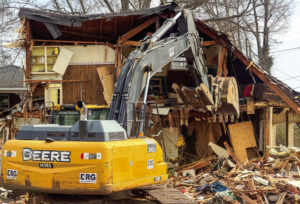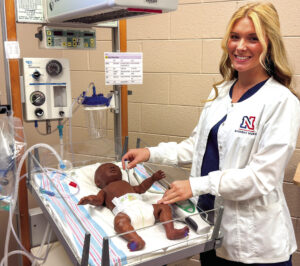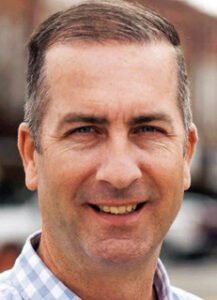Safety is a priority throughout holidays; use fire alarms and have a safety plan
RUSSELLVILLE — As temperatures drop and the use of heaters, ovens and space heaters increases, members of the Russellville Fire Department are urging the community to check their smoke alarms and review home fire safety plans.
Free smoke alarms are available to Russellville residents who live inside the city limits through the Vision 2020 program, which provides one alarm per floor with free installation. People can request help by calling 256-3328760, ext. 2.
Smoke alarms remain the most effective way to prevent injuries and deaths in a house fire.
Fire Marshal Justin Green said working alarms should be replaced every 10 years. Alarms that are discolored like a manila folder should be replaced, and batteries should be replaced every six months.
He said alarms should also be tested monthly to be sure they still work.
Hard-wired alarms should replace with new hard-wired units that include a battery backup. Green said those models are usually interconnected, so if one sounds, all of them will sound.
Older homes not wired for alarms can use newer wireless smoke alarms.
Green said the department can install alarms people purchase, as well as the free alarms provided through the Vision 2020 program.
Green said firefighters will also help people decide where any additional purchased alarms should go.
Chief Joe Mansell said the Vision 2020 program expanded after the Alabama Fire College began delivering alarms directly to departments.
He said firefighters have seen smoke alarms and school fire-prevention lessons save lives.
He recalled a fire on College Avenue where a young girl woke to the alarm, told her mother to crawl low under the smoke, and helped her get outside. He said both escaped safely before firefighters arrived.
Firefighters once tried going door to door to install alarms, but Mansell said they could not reach every household that way. He said the department now focuses on installation requests and targeted education.
Green said crews will visit homes inside the city limits to check for fire hazards when requested. He said firefighters can walk through a home, look for problems and offer suggestions but cannot require changes.
Common hazards
Common problems include overloaded outlets and extension cords that are worn, pinched or run under rugs.
Green said the department recommends avoiding extension cords and using surge protectors instead.
Firefighter Michael Hall said surge protectors only work properly when plugged into a grounded outlet with three prongs. He said older two-prong outlets will not allow the surge protector to work as intended.
Hall said thin brown extension cords often sold in discount stores are designed only for shortterm, light use. He said people should not use them under rugs, under furniture or as permanent wiring.
Hall said breakers that trip repeatedly can signal overloaded circuits or other wiring problems.
He said those issues should be checked by a qualified person.
Heaters
Hall said space heaters should have tip-over protection and should be kept at least three feet away from anything that can burn.
He said ceramic heaters are generally safer than older radiant heaters because their outer surfaces run cooler. Space heaters should always be plugged directly into a wall outlet. Hall said they should not be used with extension cords, power strips or multiplug adapters.
Hall said candles, plugin scent warmers and other devices that produce heat should be used with care. He said units that run out of oil should be unplugged and should not be left operating overnight.
Wax warmers that use low-wattage bulbs are safer than plug-in oil units. Hall said anything that gets hot should still be kept away from curtains and decorations.
Kitchens
Green said kitchens are another common trouble spot.
He said the department prefers that people get out and call 911 if they are not sure they can safely put out a small fire.
Water should never be used on a grease fire. Green said fire blankets or household extinguishers rated for kitchen use are better options.
Hall said many homes use multipurpose ABC extinguishers that can handle trash, liquids and electrical fires. He said smaller liquid extinguishers sold in larger stores are easier for many people to handle, especially older adults.
Extinguishers should be placed where they can be reached quickly. He said the department recommends keeping them in upper cabinets near kitchen exits.
The department can also provide extinguisher demonstrations for businesses and community groups.
Escape plans
Green said an escape plan is just as important as having working smoke alarms.
Every family should choose a meeting place in front of the home that is away from the driveway and street but easy for firefighters to see.
A smoke alarm should be treated as a signal to get out, not a signal to investigate.
Green said families should practice getting outside and letting 911 know whether everyone is accounted for.
Hall said bedroom doors should be closed at night to slow fire and smoke.
He said closed doors should be checked with the back of the hand before they are opened.
People in two-story homes should have emergency escape ladders in upstairs rooms. Hall said homeowners should test the ladder location in advance to be sure it reaches the ground.
Windows meant to serve as secondary exits should open easily. Hall said windows painted shut or blocked by furniture can slow an escape.
Holiday fire risks
Hall said colder weather and the holiday season bring extra fire risks. He said live Christmas trees that begin dropping needles even when watered should be removed because they can burn quickly.
LED lights for trees are safer than older incandescent strings.
Hall said decorations should be checked for damaged cords or loose connections.
Turkey fryers that use oil can be dangerous if the bird is not completely thawed. Hall said ice or water reacting with hot oil can cause the oil to boil over and ignite. Handles on pots and pans should be turned inward.
Hall said loose clothing, long hair and children should be kept back from stoves and fryers.
People should also be careful with electronics and rechargeable batteries. Hall said phones and other devices should not be left on chargers for long periods.
Mansell said the department’s goal is for every home in the city to have a working smoke alarm and a basic safety plan. He said firefighters never want to see another fire fatality in Russellville if it can be prevented.
Breakout Box 1: Storm-shelter registry Russellville Fire Department is creating a voluntary storm-shelter registry for homes inside the city limits.
Homeowners can provide their address, phone number and the location of their above-ground or below-ground storm shelter, so firefighters will have the information before severe weather strikes.
The registry uses GPS locations to help crews reach shelters even if debris covers streets or structures after a storm. This helps responders quickly check on people who may be inside.
To participate, residents can call 256-3328760, ext. 2.
Breakout Box 2: Weather alerts, radios Weather radios remain one of the most reliable ways to receive warnings because they work even when cell signals or power fail.
Programmable models are easy to set up, and firefighters will help program radios for anyone who brings them to the station.
The department also recommends using Franklin County’s My Alerts app, which allows people to choose their home and other locations for notifications.
Fire Marshal Justin Green said families should have more than one way to receive alerts so warnings are not missed during storms.








